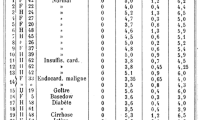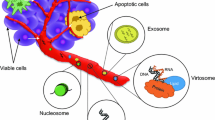Abstract
Cell-free circulating DNA in plasma and serum may serve as a biomarker for malignant tumor detection and follow up in patients with a variety of solid tumors including prostate cancer. In healthy patients, DNA is normally released from an apoptotic source which generates small fragments of cell-free DNA, whereas cancer patients have cell-free circulating DNA that originated from necrosis, autophagy, or mitotic catastrophe. Cell-free circulating DNA levels were measured by a quantitative real-time PCR method with a set of primers targeted to amplify the consensus ALU apoptotic versus necrotic origin. Prostate cancer patients before and 3 months after diagnosis showed cell-free circulating DNA released at apoptotic and non-apoptotic cell death. Interestingly, all patients after 6 months demonstrated DNA released at non-apoptotic cell. The principal source of cell-free circulating DNA is of apoptotic and non-apoptotic cell death. However, during treatment, this feature could change. Therefore, the study of cell-free circulating DNA would be important to follow the evolution of the disease during the treatment.


Similar content being viewed by others
References
Instituto Nacional de Câncer-INCA Tipos de Câncer–Próstata http://www2.inca.gov.br/wps/wcm/connect/tiposdecancer/site/home/prostata. Accessed 23 Oct 2012.
Canadian Cancer Society http://www.cancer.ca/. Accessed 23 Oct 2012.
Souto CAV, Fonseca GN, Carvalhal GF, Barata HS, Souto JCS, Berger M. Sociedade Brasileira de Urologia–Câncer de Próstata: Marcadores Tumorais. 2006 http://www.projetodiretrizes.org.br/5_volume/09-CancerMar.pdf. Accessed 23 Oct 2012.
Jahr S, Hentze H, Englisch S, et al. DNA fragments in the blood of cancer patients: quantitations and evidence for their origin from apoptotic and necrotic cells. Cancer Res. 2001;61:1659–65.
Naoyuki U, Armando EG, Suzanne HH, Farin A, Taku N, Silvana M, et al. Prediction of breast tumor progression by integrity of free circulating DNA in serum. J Clin Oncol. 2006;26:4270–6.
Naoyuki U, Armando EG, Suzanne HH, Farin A, Taku N, Silvana M, et al. Increased integrity of free circulating DNA in sera of patients with colorectal or periampullary cancer: direct quantitative PCR for ALU repeats. 2006;52(6):1062–9
Sai S, Ichikawa D, Towita H, et al. Quantification of plasma cell-free DNA in patients with gastric cancer. Anticancer Res. 2007;27:2747–52.
Swanson PE, Carroll SB, Zhang XF, Mackey MA. Spontaneus premature chromosome condensation, micronucleus formation, and non-apoptotic cell death in heated Hela S3 cell. Ultrastructural observations. Am J Pathol. 1995;146:963–71.
Roninson IB, Broude EV, Chang BD. If not apoptosis, then what? treatment-induced senescence and mitotic catastrophe in tumor cells. Drug Resist Updat. 2001;4:303–13.
Wang BG, Huang HY, Chen YC, Bristow RE, Kassauei K, Cheng CC, et al. Increased plasm DNA integrity in cancer patients. Cancer Res. 2003;63:3966–8.
Serpa Neto A, Wroclawski ML, Pinto JLF, Marsicano SR, Delgado PO, Coelho PG, et al. Methodological standardization for the extraction of free DNA in plasma of peripheral blood. J Cancer Sci Ther. 2012;1:1–5.
Chan KCA, Leung S-F, Yeung S-W, Chan ATC, Lo YMD. Persistent aberrations in circulating DNA integrity after radiotherapy are associate with poor prognosis in nasopharyngeal carcinoma patients. Clin Cancer Res. 2008;14(13):4141–4.
Shi W, Lv C, Qi J, Zhao W, Wu X, Jing R, Wu X, Ju S, Chen J. Prognostic value of free DNA quantification in serum and cerebrospinal fluid in glioma patients. J Mol Neurosci. 2012;46:470–5.
Jiang W-W, Zahurak M, Goldenberg D, Milman Y, Park HL, Westra WH, Koch W, Sidransky D, Califano J. Increased plasma DNA integrity index in head and neck cancer patients. Int J Cancer. 2006;119:2673–6.
Gao Y-J, He Y-J, Yang Z-L, Shao H-Y, Zuo Y, Bai Y, Chen H, Chen X-C, Qin F-X, Tan S, Wang J, Wang L, Zhang L. Increased integrity of circulating cell-free DNA in plasma of patients with acute leukemia. Clin Chem Lab Med. 2010;48(11):1651–6.
Deligezer U, Eralp Y, Akisik EE, Akisik EZ, Saip P, Topuz E, Dalay N. Size distribution of circulating cell-free DNA in sera of breast cancer patients in the course of adjuvant chemotherapy. Clin Chem Lab Med. 2008;46(3):311–7.
Coelho PG, Marsicano SR, Delgado PO, Pinto JLF, Sant'Anna AVL, Yabiko MY, et al. Chemotherapy induces genomic instability in oral mucosal cells of women with breast cancer. J Solid Tumors. 2012;2:10–4.
Birch L, English CA, O’Donoghue K, Barigye O, Fisk NM, Keer JT. Accurate and robust quantification of circulating fetal and total DNA in maternal plasma from 5 to 41 weeks of gestation. Clin Chem. 2005;21(2):320–1.
Ellinger J, Wittkamp V, Albers P, Perabo FGE, Mueller SC, von Ruecker A, Bastian PJ. Cell-free circulating DNA: diagnostic value in patients with testicular germ cell cancer. J Urol. 2009;181:363–71.
Jin Z, EI-Deiry WS. Overview of cell death signaling pathways. Cancer Biol Ther. 2005;4:139–63.
Allen D, Butt A, Cahill D, Wheeler M, Popert R, Swaminathan R. Role of cell-free plasma DNA as a diagnostic marker for prostate cancer. Ann N Y Acad Sci. 2004;1022:76–80.
Acknowledgments
This work was supported by Fapesp Grant 10/ 50490-6. POD, FSG, and RKK were postgraduate fellows from the Instituto Uniemp/Instituto Israelita de Ensino e Pesquisa Albert Einstein.
Author information
Authors and Affiliations
Corresponding author
Rights and permissions
About this article
Cite this article
Delgado, P.O., Alves, B.C.A., de Sousa Gehrke, F. et al. Characterization of cell-free circulating DNA in plasma in patients with prostate cancer. Tumor Biol. 34, 983–986 (2013). https://doi.org/10.1007/s13277-012-0634-6
Received:
Accepted:
Published:
Issue Date:
DOI: https://doi.org/10.1007/s13277-012-0634-6




